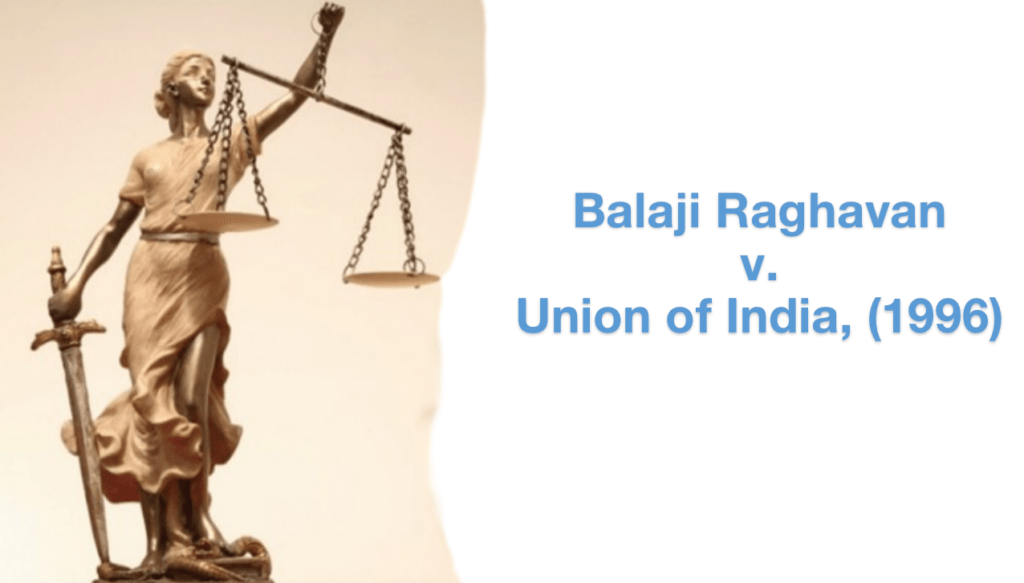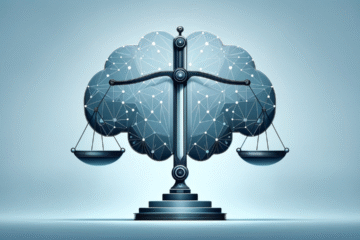
OVERVIEW
Case Name: Balaji Raghavan v. Union of India
Equivalent Citation: (1996) 1 SCC 361
Date of Judgement: 15 December 1995
Court: Supreme Court of India
Case no.: Transfer petition (civil) 09 of 1994
Case type: Civil petition
Petitioner: Balaji Raghavan
Respondent: Union of India
Bench: A.M Ahmadi, Kuldip Singh, B.P. Jeevan Reddy, N.P. Singh, S, Saghir Ahmad
Referred: Constitution of India – Article 18
FACTS OF THE CASE
- Balaji Raghavan, the petitioner, in the High Court of Kerala, filed a petition under Article 226 of the Constitution sought by way of a writ of mandamus with an aim to prevent the respondent from conferring any of the National Awards.
- Between September 30, 1992, and April 7, 1994, the contesting parties of the case filed written submissions and counters. Although, the Kerala High Court did not hear any oral arguments or pass any interim order.
- The respondent sought to transfer this case to the Supreme Court of India. On October 29, 1993, a Division Bench of the Supreme Court of India directed the matter to be posted before a bench presided over by the Chief Justice of India.
- National Awards and Honours had been instituted even before the Constitution had been formally drafted. The National Awards were formally instituted in January 1954 by a number of Presidential Notifications.
- A press note issued by the Government of India on April 17, 1978, made clear that the practice of using Civilian Awards such as Padma Vibhushan, Padma Shri etc. as titles on letterheads, invitation cards, books, posters etc. is against the scheme of the Government as the awards are not titles and their use along with the names of individuals is contrary to the spirit of the constitution which has abolished titles. The press note also emphasised that civilian awards should not be attached as suffixes or prefixes to the names of the awardees.
- On August 8, 1977, the institution of the National Awards was cancelled. But, later, on January 25, 1980, the Government of India revived these awards which were cancelled earlier. From then on, National Awards have been conferred annually on Republic Day.
- Article 18 of the Constitution of India refers to the Abolition of Titles and Article 18(1) reads – “No title, not being a military or academic distinction, shall be conferred by the State.”
ISSUE RAISED
Whether the Awards, Bharat Ratna, Padma Vibhushan, Padma Bhushan and Padma Shri are ‘Titles’ within the meaning of Article 18(1) of the Constitution of India?
CONTENTIONS OF THE PETITIONERS
- The learned counsel for the petitioner pointed out that Article 18(1) does not define the words “titles” and “distinction”. He further threw light upon this aspect by referring to the legislative history of the provision. He was of the opinion that the framers of the Constitution had intended to do away with the practice of the British who conferred various titles upon Indians who did them favours.
- As such this practice and its recipients had earned contempt from the people of India during the pre-independence period and such practices were proposed to be prohibited through this provision in independent India.
- Therefore, the learned counsel for the petitioner was of the opinion that the word ‘title’ should be given the widest possible meaning in order to give effect to the legislative intent.
- The only exceptions to this rule are military and academic distinctions and therefore all other distinctions are impliedly prohibited.
- National Awards make distinctions according to rank and since several recipients were using these awards to their names even after the Government had issued a press note in 1968 prohibiting such conduct, has resulted in the creation of rank among persons on the basis of recognition by the State in the same manner as was during the British rule. This is violative of Article 14 of the Constitution which guarantees every citizen, equality of status.
CONTENTIONS OF THE RESPONDENTS
The learned Attorney General of India for the Union of India:
- He prefaced his arguments by stating that almost every country in the world including republican and socialist constitutions follows the practice of conferring awards for meritorious services rendered by its citizens.
- According to the ordinary and contextual meaning in Article 18, the word ‘title’ means a title of honour, rank, function or office in which there is a distinctive appellation. An appellation according to him is a name or title by which a person is called or known, something which is normally suffixed or prefixed, for example – Sir, Maharaja, Nawab etc. He submitted that these appellations that appear as suffixes or prefixes are what is sought to be interdicted by Article 18(1). Since National Awards are not titles of nobility and are not to be used as suffixes or prefixes, they are not prohibited by Article 18(1).
- The words “ not being a military or academic distinction” in Article 18 have been used ex abundanti cautela. Since military and academic distinctions, such as General, Colonel, Professor, Mahavir Chakra, B.A, etc. do carry suffixes or prefixes, the framers of the Constitution, by way of abundant caution, expressly mentioned that they would be exempted. It follows that distinctions which do not carry suffixes or prefixes will not be affected by the interdiction in Article 18(1).
RATIO DECIDENDI
- The provision that is now Article 18(1) was discussed and formulated in the report of the Advisory Committee on Fundamental Rights. A note prepared by Mr K.T. Shah on Fundamental Rights contained five clauses relating to the prohibition of and restrictions on, the conferment and acceptance of titles, honours, distinctions and privileges. Clause 3 of this note read – “No artificial or man-made distinction between citizens and citizens, by way of titles, honours, privileges – whether personal or inheritable – shall be recognized by and enforceable under this Constitution, or laws made thereunder: provided that academic degrees, official titles, or popular honorifics, whether of Indian or foreign origin, may be permitted in so far as they create no privileged class or heritable distinction.
- It is clear that in enacting Article 18(1), the framers of the Constitution sought to put an end to the practice followed by the British in respect of the conferment of titles. They, therefore, prohibited titles of nobility and all other titles that carry suffixes or prefixes as they result in the creation of a distinct unequal class of citizens. However, the framers did not intend that the State should not officially recognize merit or work of extraordinary nature. However, they mandated that the honours conferred by the State should not be used as suffixes or prefixes, i.e, as titles by the recipients.
- Awards of this nature are conferred by many countries around the world. Even countries such as The United States of America, whose Constitution specifically bars the conferment of titles of nobility, follow the practice of regularly conferring civil awards. In the United States, the Presidential Medal of Freedom, instituted in 1957, honours Americans and others who make exceptional contributions to national security or interest, world peace, culture and so forth. In France, the Palmes Academiques is awarded for merit in teaching and for literature, science and other cultural activities. The Canadian Government established the Order of Canada in 1967 and it is awarded for a wide variety of fields including agriculture, ballet, medicine, philanthropy, etc.
- The National Awards are not violative of the principles of equality as guaranteed by the provisions of the Constitution. The theory of equality does not mandate that merit should not be recognized. Article 51A of the Constitution speaks of the fundamental duties of every citizen of India. Clauses (j) of Article 51A exhort every citizen “to strive towards excellence in all spheres of individual and collective activity so that the nation constantly rises to higher levels of endeavour and achievement.” It is, therefore, necessary that there should be a system of awards and decorations to recognise excellence in the performance of these duties.
JUDGEMENT
The petition was disposed of. The National Awards do not amount to “titles” within the meaning of Article 18(1) and they should not be used as suffixes or prefixes. If this is done, the defaulter should forfeit the National Award conferred on him or her by following the procedure laid down in Regulation 10 of each of the four notifications creating these National Awards. The court was of the firm opinion that there should be a system of awards and decoration in the form of National Awards to recognize excellence in the performance of citizens.
The guidelines contained in the communique from the Ministry of Home Affairs towards the selection of probable recipients are extremely wide, imprecise, amenable to abuse and wholly unsatisfactory for the important objective that they seek to achieve. There are no limitations prescribed for the maximum number of awards that can be granted in a given year or the maximum number that is permissible in each category.
While in the grant of the Bharat Ratna award, sufficient restraint has been shown, the same cannot be said of all other awards. The exercise of such restraint is absolutely necessary to safeguard the importance of the awards. That is why the need for necessarily granting awards every year also requires reconsideration. These and the fixing of other criteria, which will ensure that the recipients of these awards are subjected to feelings of respect rather than suspicion, need to be examined by a high-level Committee that may be appointed by the Prime Minister in consultation with the President of India.
CONCLUSION
Article 18(1) abolishes all titles. Military and academic distinctions are however exempted from the prohibition. Balaji Raghavan v. Union of India is a landmark judgement in which the Supreme Court of India upheld the validity of civilian honours. Bharat Ratna, Padma Vibhushan, Padma Shri etc. denote State recognition of good work in various fields of activity by the citizens of India. Therefore, National awards are not violative of the equality of status guaranteed by the Constitution of India and come under the scope of Article 18(1) of the Constitution.
This article is written by Mahima Susan John of Govt. Law College Thiruvananthapuram, an intern under Legal Vidhiya




0 Comments